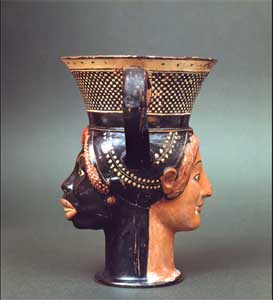
(A sequel to SKIN blog post of June 18, 2015 )
Some friends who read my essay SKIN noted that while it had a lot to say about body piercing and cutting, it said almost nothing about skin color. Is it possible, one of them wondered, that we picked up from them our bad habit of using skin pigment as a sign of racial inferiority? Can we blame the Greeks? I took a quick look and found a surprising contrast between Greek and English. Please help me improve this draft! Thanks.
Bob Connor
--
“She was green with envy.”
“I’m in a black mood.”
“He took a jaundiced view of my last blog posting.”
“He turned red with embarrassment.”
“You yellow bellied coward,”
“A white knuckle drive.”
“I’m feeling blue.”
“He’s a red neck.”
”I’m in the pink.”
English loves color coding emotions. Our language is full of expressions conveying a mood or emotion by means of color, especially skin color. So is art and of course advertising. There’s also a minor industry producing color charts of the emotions. And of course the races get distinguished with color names, black and white, yellow and red. How about ancient Greek? Does that language do anything similar? Not to any comparable extent, as best I can tell. But when Greek does link color to emotions surprising things emerge, especially when black and white are concerned. .
The Greeks had a rich vocabulary for color, but they did not divide the color spectrum in quite the way we do. The same word, melas, for example, can refer to the color of blood, dark soil, an ocean wave or of the skin of a strong man’s body (Demosthenes 21. 71), or just plain black. Similarly, the word we commonly translate “white,” leukos , can mean “pale,” sometimes almost “colorless.”
The Greeks closely observed the color on the skin, including changes such as blushing (for example, Xenophon Cyropaedia 1.4.4.). They also recognized the pallor on the face of a miser or a philosopher (see LSJ s.v. ώχρός), They were interested in the skin color of other people, as when Herodotus (2.104.2) commented that the residents of Colchis and of Egypt both had swarthy skin (melagchroes). Greek vases sometimes juxtapose black faces and white.
The Greeks, however, seem not to have used “black” as a shorthand for inferiority. In fact, for a Greek white skin was more likely to have those connotations, as when a Spartan commander gave the order “ that the barbarians who were captured by the Greek raiding parties should be exposed for sale naked. Thus the soldiers, seeing that these men were white-skinned because they never were without their clothing, and soft and unused to toil because they always rode in carriages, came to the conclusion that the war would be in no way different from having to fight with women.” (Xenophon Hellenica 3.4.19, trans. Brownson).
It’s not surprising then to find leukos, “white, / pale,” and its compounds used as an insult. Furthermore, since women were expected to avoid the outdoors and thereby maintain an untanned skin, white skin on a man suggested effeminacy, as in the comedy Ecclesiazusae 426, or in the Thersmophoriazusae where Aristophanes has Euripides say to a rival:
… I have grey hair (polios) and a long beard; whereas you, you are good-looking, charming, and close-shaven; you are white skinned (leukos), delicate, have a woman's voice and are pretty to look at. (Thesmophoriazusae 189 -92, trans. Hall and Geldart, modified).
Or one could use a pun to carry the insult one step further as the comic poet Callias seems to have done, punning on the common insult euruproktos, “with a reamed ass,” calling someone leukoproktos, “with a well creamed ass.”
So, OK, white supremacists, stop wrapping yourself in the Confederate flag, strip down, and hike to the tanning salon.


 RSS Feed
RSS Feed
